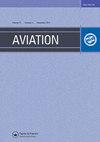基于SUGENO型模糊推理系统的参赛者能力识别
IF 1.3
Q3 ENGINEERING, AEROSPACE
引用次数: 0
摘要
在对调度员和飞行员进行有效的航空培训的条件下,需要使用能够在模糊不确定性条件下实时工作的信息通信系统。这种系统的功能是基于模糊推理系统。然而,这些系统的开发和实施需要创建模糊知识库。因此,本研究特别关注模糊推理系统的创建和该系统的模糊知识库的形成。结果是一个菱形模糊推理系统。该系统的模糊知识库包含一些规则,根据这些规则,根据不同复杂度的计算机游戏测试问题的结果,得出申请人获得某一专业知识和技能的能力的结论。在制定规则时,既考虑了通过不同级别的专业计算机测试游戏的结果,也考虑了调度员和飞行员的兴趣。因此,所提出的模糊推理系统知识库的模糊规则不仅可以评估控制器或飞行员解决某些问题的能力。输入数据集对时间的这种依赖性允许实现Sugeno类型的模糊推理系统,在形成推理时使用清晰的输入数据。本文章由计算机程序翻译,如有差异,请以英文原文为准。
IDENTIFICATION OF ENTRANT’S ABILITIES ON THE BASIS OF SUGENO-TYPE FUZZY INFERENCE SYSTEMS
In the conditions of effective training in aviation for dispatchers and pilots, it requires the use of infocommunication systems capable of working under conditions of fuzzy uncertainty in real time. The functioning of such systems is based on fuzzy inference systems. However, the development and implementation of these systems requires the creation of fuzzy knowledge bases. Therefore, special attention in this study is paid to the creation of a system of fuzzy inferences and the formation of a fuzzy knowledge base of this system. The result is a lozenge-type fuzzy inference system. The fuzzy knowledge base of the system contains the rules according to which, based on the results of test computer game problems of varying complexity, a conclusion is formed about the applicant’s ability to acquire knowledge and skills in a certain specialty.When developing the rules, both the results of passing different levels of professionally oriented computer test games were taken into account, and the interest of dispatchers and pilots was taken into account. Therefore, the proposed fuzzy rules of the knowledge base of the fuzzy inference system make it possible to assess not only the ability of the controller or pilot to solve certain problems. This dependence of the input dataset on time allows the implementation of a fuzzy inference system of the Sugeno type, using clear input data in the formation of inferences.
求助全文
通过发布文献求助,成功后即可免费获取论文全文。
去求助
来源期刊

Aviation
ENGINEERING, AEROSPACE-
CiteScore
2.40
自引率
10.00%
发文量
20
审稿时长
15 weeks
期刊介绍:
CONCERNING THE FOLLOWING FIELDS OF RESEARCH: ▪ Flight Physics ▪ Air Traffic Management ▪ Aerostructures ▪ Airports ▪ Propulsion ▪ Human Factors ▪ Aircraft Avionics, Systems and Equipment ▪ Air Transport Technologies and Development ▪ Flight Mechanics ▪ History of Aviation ▪ Integrated Design and Validation (method and tools) Besides, it publishes: short reports and notes, reviews, reports about conferences and workshops
 求助内容:
求助内容: 应助结果提醒方式:
应助结果提醒方式:


